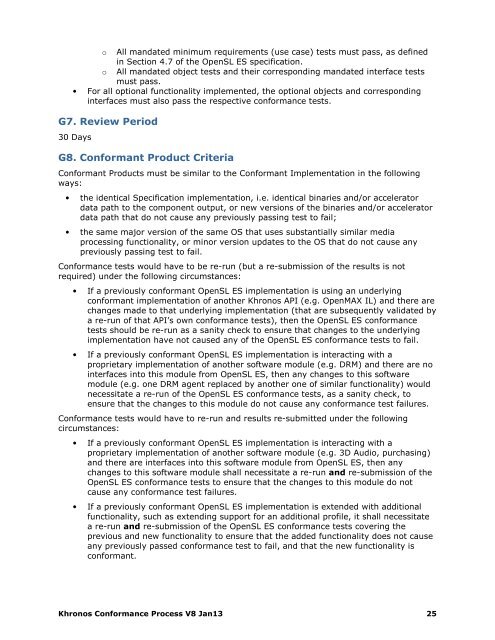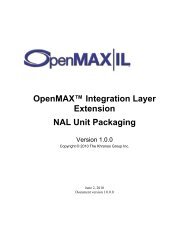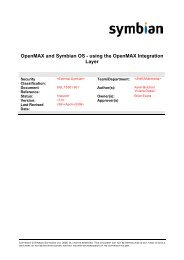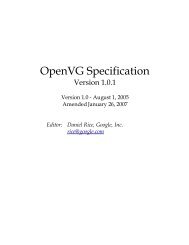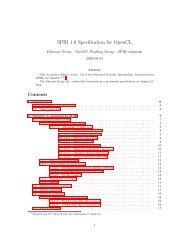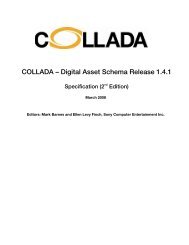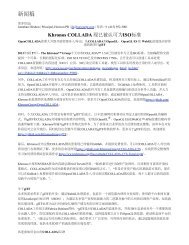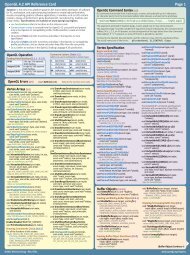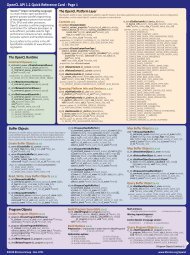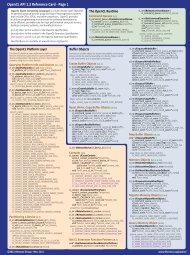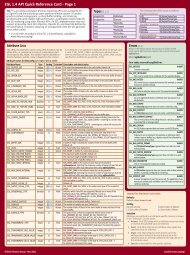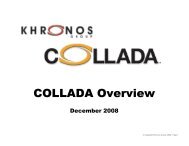Khronos Group Conformance Test Process Procedures
Khronos Group Conformance Test Process Procedures
Khronos Group Conformance Test Process Procedures
You also want an ePaper? Increase the reach of your titles
YUMPU automatically turns print PDFs into web optimized ePapers that Google loves.
o All mandated minimum requirements (use case) tests must pass, as defined<br />
in Section 4.7 of the OpenSL ES specification.<br />
o All mandated object tests and their corresponding mandated interface tests<br />
must pass.<br />
• For all optional functionality implemented, the optional objects and corresponding<br />
interfaces must also pass the respective conformance tests.<br />
G7. Review Period<br />
30 Days<br />
G8. Conformant Product Criteria<br />
Conformant Products must be similar to the Conformant Implementation in the following<br />
ways:<br />
• the identical Specification implementation, i.e. identical binaries and/or accelerator<br />
data path to the component output, or new versions of the binaries and/or accelerator<br />
data path that do not cause any previously passing test to fail;<br />
• the same major version of the same OS that uses substantially similar media<br />
processing functionality, or minor version updates to the OS that do not cause any<br />
previously passing test to fail.<br />
<strong>Conformance</strong> tests would have to be re-run (but a re-submission of the results is not<br />
required) under the following circumstances:<br />
• If a previously conformant OpenSL ES implementation is using an underlying<br />
conformant implementation of another <strong>Khronos</strong> API (e.g. OpenMAX IL) and there are<br />
changes made to that underlying implementation (that are subsequently validated by<br />
a re-run of that API’s own conformance tests), then the OpenSL ES conformance<br />
tests should be re-run as a sanity check to ensure that changes to the underlying<br />
implementation have not caused any of the OpenSL ES conformance tests to fail.<br />
• If a previously conformant OpenSL ES implementation is interacting with a<br />
proprietary implementation of another software module (e.g. DRM) and there are no<br />
interfaces into this module from OpenSL ES, then any changes to this software<br />
module (e.g. one DRM agent replaced by another one of similar functionality) would<br />
necessitate a re-run of the OpenSL ES conformance tests, as a sanity check, to<br />
ensure that the changes to this module do not cause any conformance test failures.<br />
<strong>Conformance</strong> tests would have to re-run and results re-submitted under the following<br />
circumstances:<br />
• If a previously conformant OpenSL ES implementation is interacting with a<br />
proprietary implementation of another software module (e.g. 3D Audio, purchasing)<br />
and there are interfaces into this software module from OpenSL ES, then any<br />
changes to this software module shall necessitate a re-run and re-submission of the<br />
OpenSL ES conformance tests to ensure that the changes to this module do not<br />
cause any conformance test failures.<br />
• If a previously conformant OpenSL ES implementation is extended with additional<br />
functionality, such as extending support for an additional profile, it shall necessitate<br />
a re-run and re-submission of the OpenSL ES conformance tests covering the<br />
previous and new functionality to ensure that the added functionality does not cause<br />
any previously passed conformance test to fail, and that the new functionality is<br />
conformant.<br />
<strong>Khronos</strong> <strong>Conformance</strong> <strong>Process</strong> V8 Jan13 25


